Public Comment Denied After State Finds BTEX & Unidentified Compounds in Drinking Water Investigation
Public Comment Denied After State Finds BTEX & Unidentified Compounds in Drinking Water Investigation
December 23, 2015
by Melissa Troutman, Executive Director, Public Herald
this story is part 4 of 6 in the INVISIBLE HAND series which covers open meetings and the execution of local and state laws
UPDATED: (01/02/2016) included quote from Melissa Melewsky, Media Law Counsel at Pennsylvania NewsMedia Association, about options for citizens in the event of a believed violation to the Pennsylvania Sunshine Act, and cited the section on objections under the act.
“After sitting through almost two hours of those presentations, there’s no way I’m using my water,” said a resident of the North Hollow JKLM Energy investigation who attended a meeting to be assured their water was safe to drink.
On a Thursday morning in Potter County, Pennsylvania from 10 a.m. to noon when most people were at work, a public meeting held by county commissioners failed to provide opportunity for public comment regarding contamination to drinking water supplies.
Three months after groundwater contamination resulting from JKLM Energy oil and gas operations in Potter County by, the public had it’s first chance to be face-to-face with state regulators, company and county representatives to find out the status of local water supplies. Read the series of stories published by Public Herald at publicherald.org/north-hollow/. © Joshua B. Pribanic for Public Herald
“The meeting should have been divided up so there was equal time for presentation and public comment,” said the North Hollow resident, who’s drinking water had been investigated. In an interview with Public Herald, the resident, who wishes to remain anonymous at this time, looked back on their choice to live in the area, saying “Our biggest goal in life was to have a piece of land and our own water well.”
The December 17th meeting was the first opportunity the public had to comment with county officials on results of a three-month ongoing investigation by state regulators and JKLM representatives, all present at the meeting. In September 2015, the company illegally injected unapproved chemicals underground during drilling operations — chemicals that are typically used for fracking — that ended up contaminating groundwater and surface water in Sweden Township, near the borough of Coudersport, prompting two public water supplies to also be shut down.
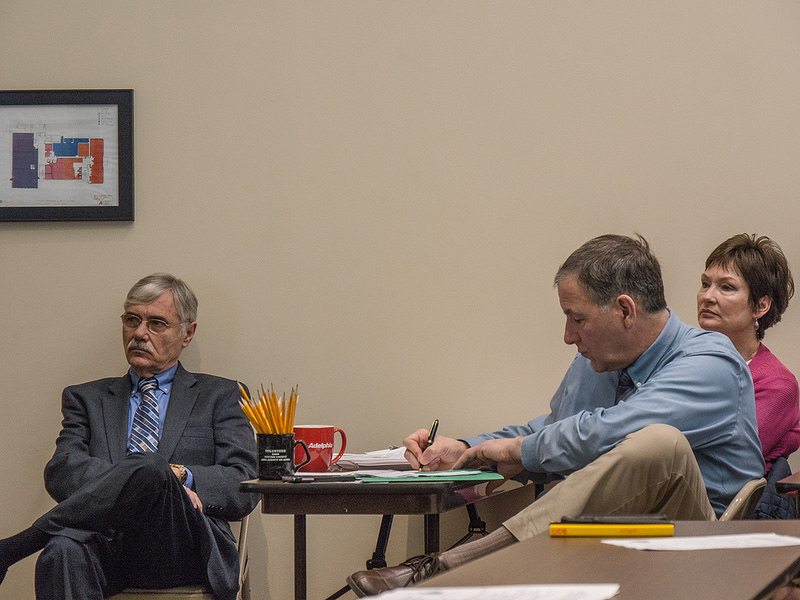
Potter County Commissioner Doug Morley (left) watches the JKLM presentation while commissioner Paul Heimel (right) takes notes. © Joshua B. Pribanic for Public Herald
At the meeting county commissioners attempted to restrict discourse to notecards, having attendees submit their written questions to commissioners rather than providing time for public comment. Public Herald Editor-in-chief made an objection to the notecards, citing the Pennsylvania Sunshine Act requirement for public participation.
“Any person has the right to raise an objection at any time to a perceived violation of this chapter at any meeting of a board or council of a political subdivision or an authority created by a political subdivision.” Pennsylvania Sunshine Act 65 Pa.C.S.A. § 710.1. Public participation
The objection later caused the commissioners to open the floor for discussion, two minutes before the meeting’s scheduled end. But the opportunity was stymied by oil and gas attorneys — one stating it was not a public hearing — and the other who helped one commissioner find words to close the meeting, ending the public comment period.
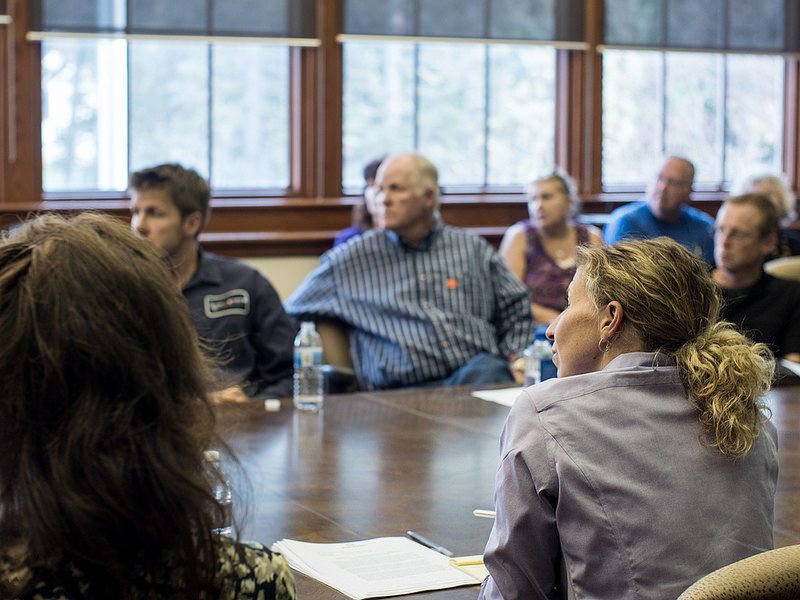
Oil and gas attorney Jessica Songster, pictured here (right) at a September JKLM emergency meeting, prompted Commissioner Doug Morley to “thank people for coming.” Morley then closed the meeting. DEP representatives, JKLM representatives, county officials and local water specialists all promptly left the room. © Joshua B. Pribanic for Public Herald
A failure to provide for public comment is a violation of the Sunshine Act, “The Sunshine Act requires the opportunity for public comment at every advertised regular and special meeting. So, there has to be an opportunity for public comment.”
That’s Melissa Melewsky, Media Law Counsel at Pennsylvania NewsMedia Association.
Public Herald asked Melewsky if providing notecards and pencils for people to submit questions for county commissioners to read would be sufficient opportunity for public comment.
“No,” she said. “Public comment is not ‘public question’ – not the same thing. In order to give public comment, you don’t have to phrase it as a question. You can say, ‘I disagree with what you’re doing.’
“For public comment, you open it up to anyone in attendance, and they can limit to taxpayers and residents, to get up and say their piece, that may or may not be in the form of a question. You can’t limit public comment to questions only.”
Melewsky further pointed out that an open meeting happens when a quorum of officials are present with deliberation:
“It’s any deliberation of agency business. A deliberation of agency business is defined broadly: it’s the discussion of agency business held for the purpose of making a decision…issues that are ongoing in the county would be agency business.”
The Digital Media Law Project of Harvard University says an open meeting must have three characteristics: be prearranged, have a quorum, and discuss or deliberate agency business.
The meeting was hosted by the Potter County Natural Gas Resource Center, formerly the Natural Gas Task Force, which was formed and is still operated by county commissioners since 2009 with a purpose “to oversee water quality, job training, public safety/emergency services, and municipal issues.” The “county-sponsored task force” combined with Potter County Education Council to become the Natural Gas Resource Center.
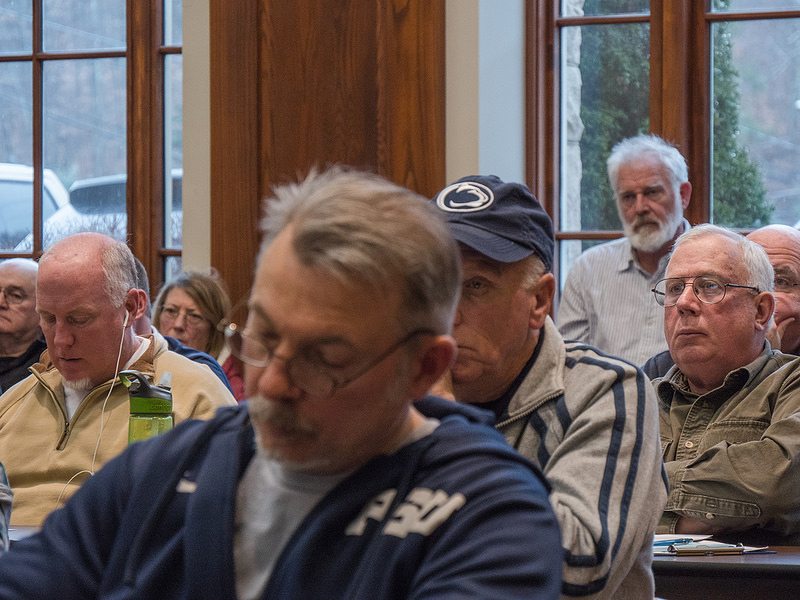
Potter County residents watch and listen to a presentation from DEP on the JKLM North Hollow complaint investigation held in Coudersport, PA. © Joshua B. Pribanic for Public Herald
Trade Secrets: Regulating a Mystery
Back when groundwater was first contaminated in September, JKLM’s leadership declined to provide the full list of chemicals used by the company. At Thursday’s public meeting three months later, it became clear that JKLM had not known the chemical composition of the products it used. And no one can reveal a list that doesn’t exist.
“In order to begin the investigation quickly, we didn’t have time to analyze these products before we went out and starting sampling [water] sources. So we had to use some professional judgement looking at the information that was available to us on the SDS [Safety Data Sheet] and on the internet regarding these compounds,” explained JKLM’s hired environmental firm, Penn E&R.
“At this point I think it’s fair to say that we probably know as much about what’s in those products as the manufacturers do,” said Scott Blauvelt, Director of Regulatory Affairs for JKLM. [Emphasis added.]
However, even now that JKLM has a “very, very detailed chemical analysis,” the company is not revealing the full list of known chemical compounds or their amount. JKLM attorney John Sieminski went so far as to squash further questions regarding specific test results:
“We told you what we know about the chemical analysis,” Sieminski said. “It’s not concerning. End of story. Next question.”
“Unidentified Compounds,” BTEX and Plasticizers Detected in Water Samples
For the first time at the meeting since contamination began in September, DEP and JKLM revealed that BTEX compounds – otherwise known as Benzene, Toluene, Ethylbenzene, and Xylene – have been discovered by both the department and the company during their investigations.
Penn E&R, the environmental company hired by JKLM to carry out an investigation, said that traces of ‘rock drill oil’ (also referrred to as ‘hammer bit oil’) were discovered in their water tests after a chemical makeup of the substance was determined:
“The hammer bit oil, again predominantly mineral-based, and it contained a number of compounds that you’d typically find in petroleum products. We did find some BTEX.”
DEP’s Bill Kosmer was uncertain about the actually amounts detected: “I don’t believe anything [was detected] over a standard, but they [BTEX] were there.” Neither DEP or JKLM revealed any specific test results despite “extensive, sophisticated” investigations.
DEP revealed it has investigated 14 complaints and confirmed that six private water supplies have been contaminated by JKLM Energy’s operations. Seven more water supplies are still under investigation.
“There were two additional complaints that did not want DEP involvement,” Kohl revealed in a December 21st email to Public Herald, bringing the complaint total to 16. Kohl also confirmed via email that DEP has “not received all of the information gathered by JKLM” about the chemical composition of the products that were used when contamination occurred.
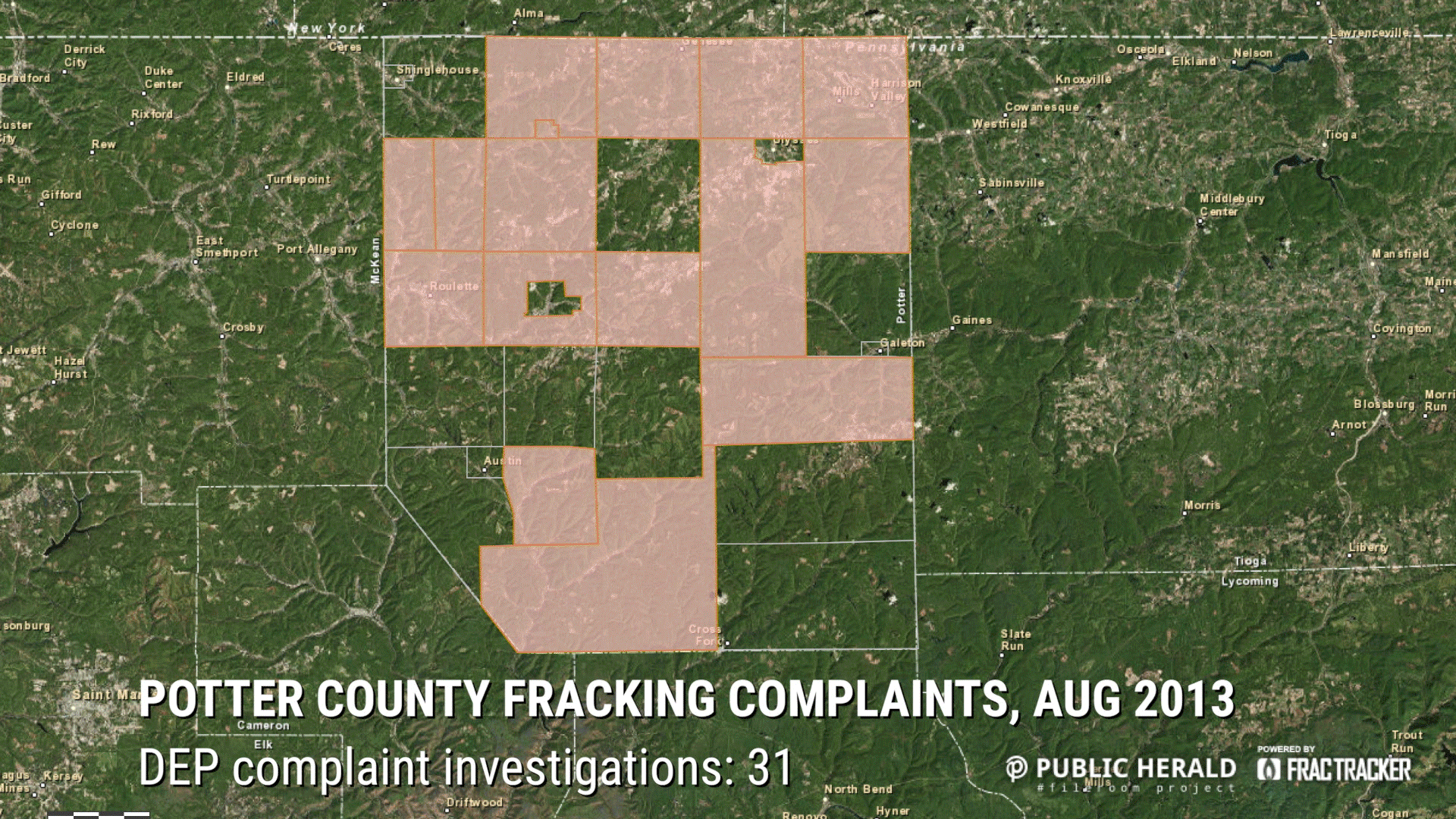
GIF of Potter County complaint investigations from data publicly available at #fileroom. © Oz Gerard for Public Herald
“It is typically the product manufacturer’s decision to claim ingredients as trade secret or proprietary,” Kohl wrote. “We did not reach out to the manufacturer directly to attempt to gain this information. We felt our efforts were better served by independently sampling the product and also sampling an extensive list of parameters in the potentially affected water supplies.”
“Tentatively Identified Compounds (TICs)” were detected in at least two water supplies, according to DEP letters to homeowner that were shared with Public Herald. According to the U.S. Environmental Protection Agency, TICs are a “tool used by EPA to characterize hazardous sites. TIC analysis is a useful tool that can aid in clean-up or treatment decisions by identifying compounds that might otherwise be missed at the site.”
DEP neglected to reveal the detection of TICs in private water supplies during its public presentation.
In a letter sent to one homeowner, who called in a complaint on October 6th, DEP wrote that an investigation to the resident’s water supply is “ongoing” after TICs were detected along with high iron and turbidity.
In a determination letter sent to a separate homeowner, who called DEP for help on October 7th, DEP found TICs again. In both letters, DEP states “the presence of TICs are not considered absolute or confirmed by the laboratory, but rather, indicates a spike of a compound for which the instrument is not calibrated.” In this home’s water sample, DEP also reports finding Bis(2-ethylhexyl) phthalate, which is an organic compound commonly used as a plasticizer or “water reducer.”
DEP revealed during its presentation that the department found “two plasticizers” in water monitoring wells installed at JKLM’s well pad in addition to “the same sort of contaminants found at other sampling points, the MBAS, the BTEX.” The department neglected to reveal the specific names of those two plasticizers.
DEP stated at the meeting that it will continue to examine the presence of unidentified compounds and plasticizers.
“We’ll continue to look at them and see and try to understand if [lab contamination] is where they’re from or if it’s from something that was used on the pad. We haven’t drawn a formal conclusion on that,” DEP added.
Regulating A Mystery: When Is Water Really Safe To Drink?
With so many unknowns remaining, some residents are nervous. When Public Herald asked a resident why they wouldn’t drink the water, they explained:
“I have a lot of experience with this sort of thing. JKLM didn’t know what they put down that hole, and DEP is finding BTEX? That’s not good. What they did tell us they used – those lubricants – they stick to well casings, which in this case JKLM didn’t even have, so my question is, how long are those chemicals going to stick around in the ground? How far are they going to travel and for how long? DEP doesn’t know.”
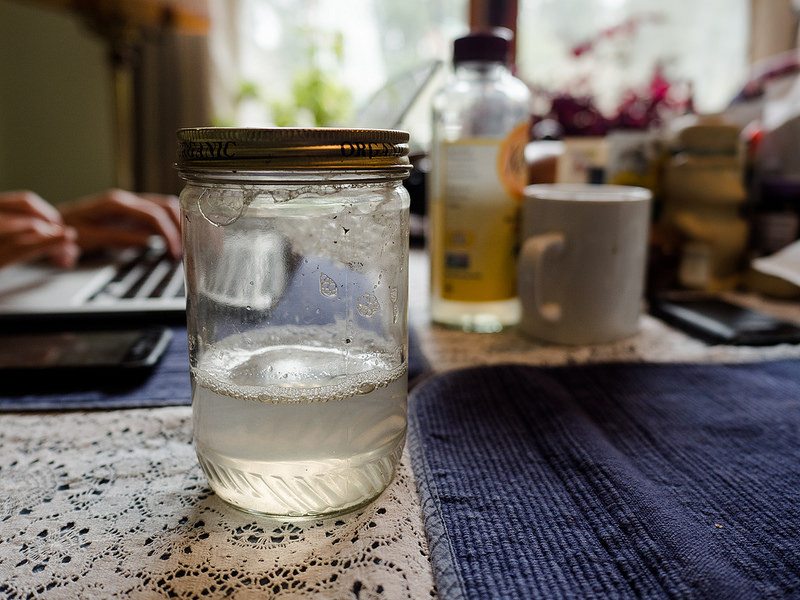
If you’re having trouble reading your water quality test results please contact Public Herald for assistance at [email protected] or use our contact button at the bottom right of the page. Photo: A jar of foamy water collected near the North Hollow tributary by local residents. © Joshua B. Pribanic for Public Herald
Benzene is a BTEX compound and known carcinogen, which both DEP and JKLM discovered in water tests. According to a branch of the Center for Disease Control, “long-term benzene exposure causes effects on the bone marrow and can cause anemia and leukemia.” While acute exposure to children, i.e. anything short term, “can result in skin and eye irritation or burning, as well as dizziness, nausea, vomiting, and suffocation,” according an EPA report.
The Center for Disease Control writes in “Facts About Benzene” that it can be poisonous when absorbed into the body by inhalation, ingestion, or skin contact.
In September we reported how residents had “not been told by JKLM to stop using their water for washing and cooking, even though some families have young children and isopropanol can be absorbed through the skin.”
Benzene, if present, would have added to this avoidable danger.
According to the Agency for Toxic Substances and Diseases Registry (ATSDR), benzene contamination of groundwater “can result in volatilization into indoor air when the groundwater is used as household water. In addition, contamination of groundwater and subsurface soil can result in migration of these chemicals into basements as soil gas.” Although, soil gas effects would generally result from much higher concentrations of benzene either leaking from buried tanks or found on hazardous waste sites.
Not present at the meeting was the Pennsylvania Department of Health (DOH). No one mentioned the word “health” during the two hour meeting.
In an email to resident Laurie Barr, Barry Miller, who is the Epidemiology Research Associate in the Department of Health’s Division of Environmental Health Epidemiology, explained:
The Pennsylvania Department of Health (DOH) continues to closely monitor this situation, since first reported to our department on September 24, 2015. A collaborative effort is ongoing with the Department of Environmental Protection (DEP), which includes review of all available well water test reports from this incident, collected by the DEP. Our environmental health team, including the state toxicologist, carefully examine these reports. In addition to these actions, the DOH has remained available to investigate all health complaints from individuals affected by this incident. According to the DEP, data collection from this incident is ongoing and all such data will be shared with the DOH for review. Please be assured that the DOH will continue to monitor this incident and respond to all health related concerns.
Please call 717-787-3350 if you have further questions or concerns, or if you prefer, by email: [email protected].
Miller’s information has not been delivered to the public via JKLM, DEP or county websites. Residents have told Public Herald that they were unaware that DOH was involved or that they could be contacted about suspected health problems.
Media Making Matters Worse
Matters about what’s in the groundwater system and when water is really safe to drink get murkier with inaccurate and untimely reporting. For example, Bradford Era’s misleading headline: “No detrimental effect on aquifer from JKLM contamination.” There are lingering effects and DEP’s investigation will be ongoing “for some time,” according to DEP.
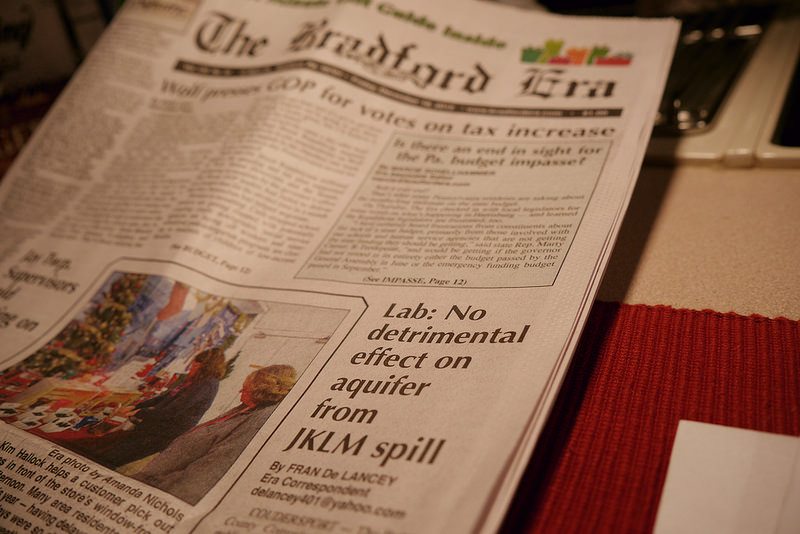
Bradford Era inaccurately printed the headline “No detrimental effect on aquifer from JKLM spill.” DEP reported “no detrimental effect” from the plugging of JKLM Energy’s botched gas well. The use of the word “spill” also misrepresents the event. © Melissa Troutman for Public Herald
What DEP actually said was that “no detrimental effect was discovered” during the plugging of JKLM’s gas well, revealed in a video recording (skip to 30:06) of the meeting. Several contaminants have been detected in monitoring wells before and after plugging, including “the same sort of contaminants, the MBAS, the BTEX” that the department found in other wells and two unnamed plasticizers.
Public Water Supplies Not Yet Cleared For Reactivation By DEP
DEP and JKLM also presented the latest information regarding two public water systems that are still offline as a result of the contamination of the local water supply area.
John Hamilton from DEP’s Bureau of Water Quality, in charge of regulating public water supplies, explained that prior to allowing the systems serve water to the public, “a 72-hour pumping and purging of the wells to stress the aquifer” must occur, after which DEP will collect split samples with both Coudersport Municipal Water Authority and Charles Cole Memorial Hospital.
“We would review sample results, and if it is determined that there is no impact to those water supplies, we would then concur and allow them to turn those supplies back on,” Hamilton said.
According to Hamilton, DEP sampled the public water supplies on September 29th and October 6th. “At this point, there has been no indication of any impacts to either water supplies. We did inform Coudersport and Cole that it’s their decision to request turning the wells back on.”
DEP did not reveal test results of the samples from public supplies.
It’s unclear whether public water purveyors plan to notify consumers about the pumping, purging, testing and potential reactivation of the two water supplies.
Investigation Will Be Ongoing “For Some Time” But Kefover Says “No More Public Meetings”
DEP and JKLM representatives both made it very clear that the results of this investigation, likely the most costly water investigation to hit Potter County since fracking development began, is only “the first phase” of a full investigation that will continue “for some time.”
Meanwhile, JKLM has been issued two permits to begin construction at other well sites and several new drilling permits are currently being considered by DEP, despite the ongoing investigation.
Public Herald asked JKLM to clarify if the company will be aware of chemicals it uses before injecting them underground, JKLM’s Director of Regulatory Affairs Scott Blauvelt failed to answer the question. Instead he replied:
“In the process of drilling that surface or top hole section of the well-bore, we encountered several fracture zones.
“Those fractures are typically encountered. That’s how groundwater moves in this part of the country, so they’re not unanticipated.”
“The hammer bit oil that should have been used was not employed,” Blauvelt said. “More appropriately we might have used a vegetable-based oil.”
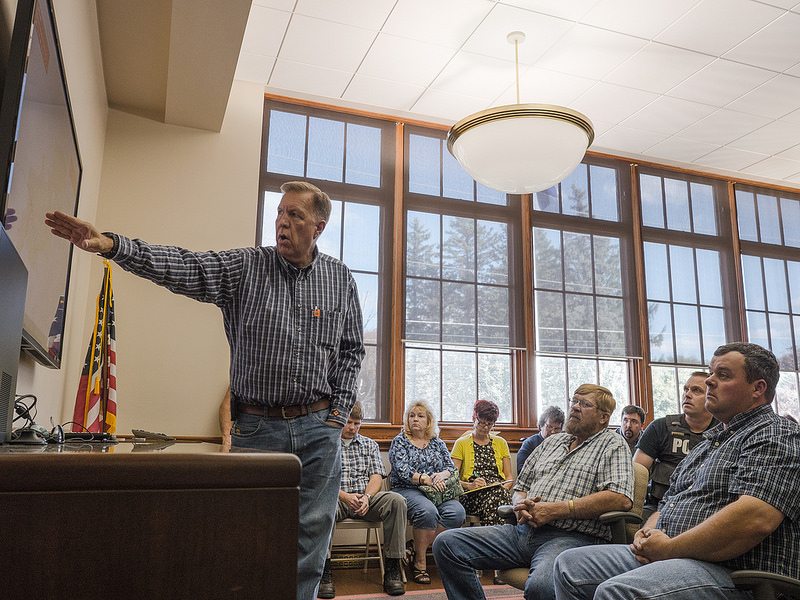
Scott Blauvelt, Director of JKLM Energy Regulatory Affairs and hydrogeologist, explains the release of a plume of pollution to local drinking water supplies from a fracking well pad operated by JKLM in Coudersport, PA. © Joshua Boaz Pribanic for Public Herald
Blauvelt added near the end of the meeting, “We knew this would be a complex undertaking and our objective was to deploy, fully deploy, a very, very experienced team of scientists and engineers to make sure that we were not leaving any stone unturned and that there was something lurking in the groundwater flow system that could be an impact to people.”
Blauvelt’s reassurance of detection and leaving no stone unturned is in contrast to JKLM test results shared with Public Herald. The documents, found in a DEP complaint investigation, indicated that JKLM tested for far fewer substances than the state in their investigation.
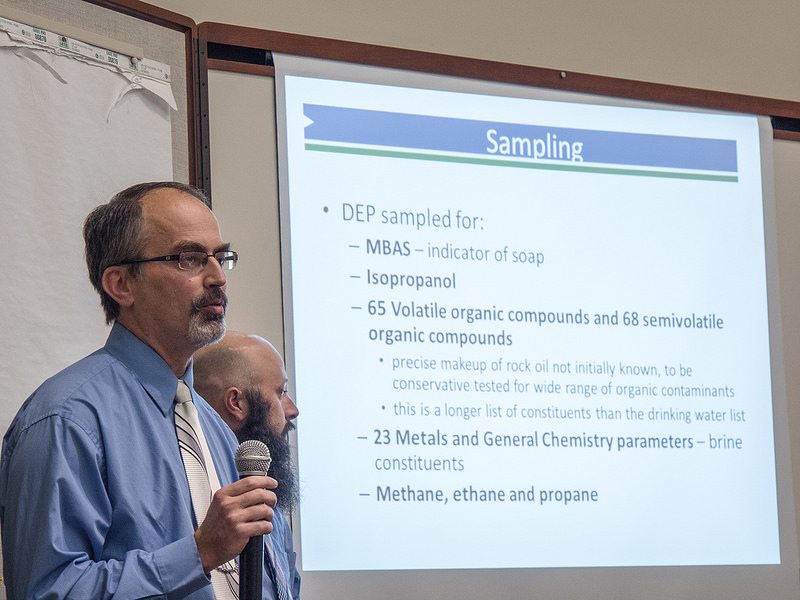
The Pennsylvania Department of Environmental Protection explain their water sampling parameters during the North Hollow JKLM complaint investigation. © Joshua B. Pribanic for Public Herald
The room, filled mostly with state, industry and county officials, fervently applauded at the meeting’s end. After the meeting, God’s Country Chapter of Trout Unlimited President Dr. Peter Ryan echoed Blauvelt from JKLM, “I think they did a wonderful job in this presentation, and they’ve, I think, left no stone unturned.”
While Public Herald was eating lunch down the street from where the meeting was held, we were approached by Commissioner Susan Kefover. After a brief discussion about the ongoing nature of the investigation and the lack of time for public comment regarding such an important matter of public health, Save Our Streams PA co-founder Laurie Barr asked the commissioner if there would be another public meeting.
Kefover replied, “There will be no more public meetings.”
However, Melewskly explained to Public Herald that “If a citizen believes there’s been a violation of the [Pennsylvania Sunshine] act they can pursue the civil penalties in the law or the criminal penalties or both.” A citizen would be expected to pursue penalties within 30 days of an alleged violation, and, if successful, could force elected officials to hold a public meeting where public comment can be recorded.
“A person who thinks there’s been a violation would file a private criminal complaint which would be against the individual county commissioners and that would be filed with the District Attorney’s office. On the civil side, they could file a civil lawsuit in the court of common pleas in the county where the agency sits and they could ask the court for appropriate relief.”
Melewsky emphasized a citizen can file the complaint to the District Attorney’s office without an attorney, but suggested contacting the local bar association to find out what attorneys handle civil cases for filing with the county.
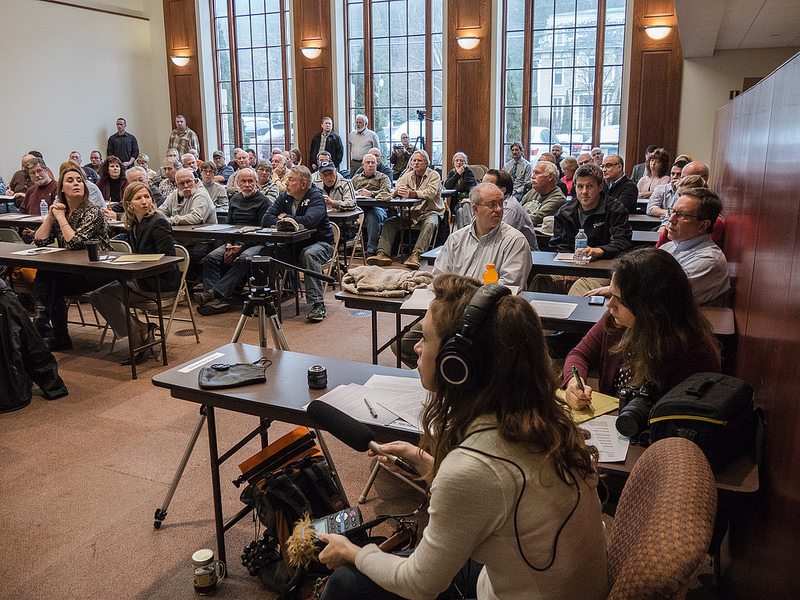





latest horror story in a litany of such in our fair State since the invasion of Gas Drilling….losing our precious , clean water…
Natural gas industry poisoning us and State politicians and agency’s helping them do it!
Thanks Public Herald for keeping us up to date ( and totally shocked)
about this situation.
I honestly believe our county commissioners (2 of them at least) are afraid of JKLM and their industry lawyers.
If it hadn’t been for the pressure from concerned citizens,Public
Herald and Save Our Streams PA, county officials would never have held
the public meeting. The beginning seemed like a page right out of Ted Cruz’s playbook, stalling a vote on the
Affordable Care Act by reading Green Eggs and Ham on the senate floor, when members of local watershed organizations began the meeting by speaking for 22 minutes of the planned 2 hour meeting, thereby reducing the remaining time of the meeting for the
DEP, JKLM presentations and index card questions and public comment period.
None of the 14 questions chosen from the index card caused a bead of sweat to develop on the brows of local, state or
JKLM officials.The public comment period lasted under 5 minutes after Melissa broke a couple of Morley’s brand
spanking new quasi-public comment period rules when she pressed JKLM to disclose the ingredients of secret sauce .
Her questions really didn’t seem to the straws that broke Morley’s back. IMO He was looking for an out and jumped at the chance…
explaining the meeting ended as he feared, expressed disappointment and ended the meeting. This deprived every other citizen the opportunity to comment.
And conveyed a loud and very clear message to Public Herald, citizens and also to JKLM; citizens’ rights, opinions
or questions don’t matter.
This behavior ( of officials) has been an affront to DEP Secretary
John Quigley and the Wolf administration’s commitment to “collaboration, transparency and integrity.”
Instead decisions are being made behind closed doors, what the public has to say is not their concern. It says to the citizens they don’t deserve timely information even if threatens their health.
The contamination episode is by no means over and presents legal, economic, public health
significance. If it wasn’t for Public Herald’s investigation, this situation
would have been swept under the Gunzburger rug( county building) and nobody would be the wiser.
Albeit there’s still a long road to hoe, as Melissa and Josh brings out the facts.
This has all the makings of becoming a landmark case. My crystal ball says, In time, legal action is on the Potter’s horizon.
Thank you Josh and Melissa if you hadn’t worked so hard, some folks would not even know this happened.